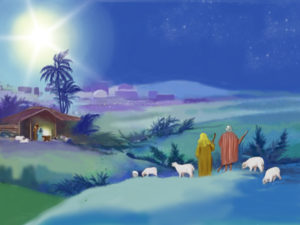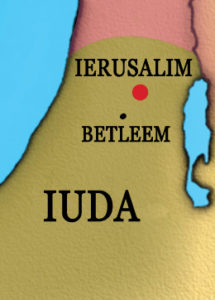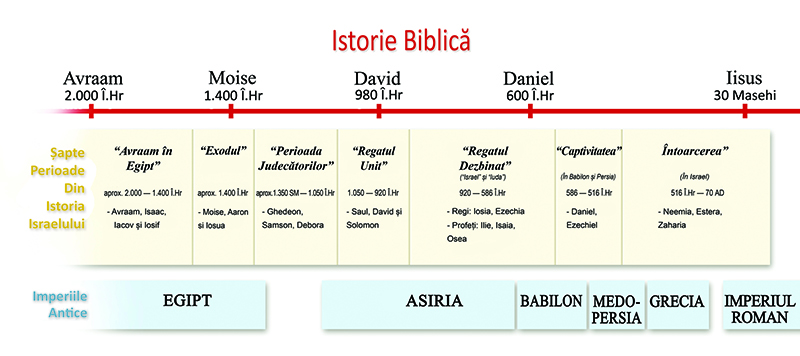[Aceasta este varianta scrisă a înregistrării cu titlul “O încadrare a profeției în istorie“.]
 Vreau să vă vorbesc despre ceva deosebit ce mi-a marcat în mod special viața. Este vorba despre profeții. E un subiect amplu. La auzul cuvântului „profeție,” diferite gânduri trec prin mintea fiecăruia, așa că am să explic la ce mă refer. Am să vă spun câte ceva despre mine, ca să înțelegeți de ce mă ineresează acest subiect.
Vreau să vă vorbesc despre ceva deosebit ce mi-a marcat în mod special viața. Este vorba despre profeții. E un subiect amplu. La auzul cuvântului „profeție,” diferite gânduri trec prin mintea fiecăruia, așa că am să explic la ce mă refer. Am să vă spun câte ceva despre mine, ca să înțelegeți de ce mă ineresează acest subiect.
M-am născut în Texas și am ajuns să merg la facultate fără să fi înțeles sau să mă fi interesat vreodată lucrurile spirituale. Devenisem ateu și făceam tot ce puteam să întorc de la credință pe oricare ar fi avut vreun fel de credință în Dumnezeu.
Printr-un complex de evenimente am ajuns în punctul în care a trebuit să recunosc… că există o dimensiune spirituală. Nu vroiam să devin “habotnic”, dar știam, îmi dădusem seama, că există o dimensiune în care se găsesc și spirite bune, și spirite rele. Eu vroiam să fiu cu cele bune.
Eu vroiam să fiu cu cele bune.
Căutările mele m-au adus în contact cu diferite grupuri și, astfel, am întâlnit alți tineri, creștini cu vederi radicale sau, „Țicniții lui Iisus”, cum erau numiți pe atunci iar ei au reușit să mă ajute să înțeleg adevărurile din Biblie. Dumnezeu a folosit această împrejurare ca să îmi ofere un nou început și, pînă la urmă, mi-am dedicat viața în slujba Lui. Am trăit peste hotare mai bine de 30 de ani și m-am bucurat de o viață minunată, lucru pentru care sunt foarte recunoscător.
Deci, când vorbesc despre profeție, mă refer, de cele mai multe ori, la profeții din Biblie. Pe asta vom pune accentul în această serie de studii. O să ne ocupăm de profetul Daniel din Vechiul Testament. De fapt, când Iisus a fost întrebat despre viitor, l-a menționat în mod specific pe profetul Daniel. A spus: “Când veți vedea (evenimentele viitoare)… despre care a vorbit profetul Daniel (cine citește să înțeleagă)…” (Matei 24:15)
Îmi închipui că unii dintre cei care se uită la acest program au aflat destule despre acest subiect și de-abia așteptați să intrăm în detalii. Alții nu cunosc mai nimic despre toate acestea. Vreau să me adresez și unora, și altora, dar dacă ar trebui să aleg între cele două categorii, prefer să mă adresez celor pentru care acesta este un subiect nou. Așa eram și eu până când am ajuns aproape la maturitate. Acesta este, probabil, unul dintre motivele pentru care vreau ca și voi să bucurați de încântarea de a cunoaște adevărurile din cartea lui Dumnezeu, Biblia.
Acum, poate că unii dintre voi se întreabă: “Ce mai este și profeția?” Vă gândiți că, „da, sigur, sigur, într-o bună zi lumea se va sfârși și chestii din astea.” Așa credeam și eu cândva și totul mi se părea bizar și chiar stupid.
 Bun! Haideți să vedem dacă există ceva despre care a auzit fiecare dintre cei care se uită la acest program și care a fost profețit cu sute de ani înainte de a se întâmpla. Putem spune cu siguranță că fiecare dintre cei care urmăresc acest program au auzit despre Crăciun. Știți că de Crăciun oamenii cântă colinde. Se sărbătorește nașterea lui Iisus și ați văzut imagini cu Maria și Iosif și cu pruncul Iisus.
Bun! Haideți să vedem dacă există ceva despre care a auzit fiecare dintre cei care se uită la acest program și care a fost profețit cu sute de ani înainte de a se întâmpla. Putem spune cu siguranță că fiecare dintre cei care urmăresc acest program au auzit despre Crăciun. Știți că de Crăciun oamenii cântă colinde. Se sărbătorește nașterea lui Iisus și ați văzut imagini cu Maria și Iosif și cu pruncul Iisus.
 Ați auzit, probabil, un vechi colind, nu prea pot eu să îl cânt, dar e cam așa: “În seara de Crăciun venim/ La Vilflaim, la Viflaim/ Pe pruncul sfânt să-L preamărim/ La Viflaim, la Viflaim.
Ați auzit, probabil, un vechi colind, nu prea pot eu să îl cânt, dar e cam așa: “În seara de Crăciun venim/ La Vilflaim, la Viflaim/ Pe pruncul sfânt să-L preamărim/ La Viflaim, la Viflaim.
Acest colind este despre orășelul Betleem, de lângă Ierusalim, unde s-a născut Iisus. Poate că deja știați că acolo s-a născut, sau poate vă amintiți că ați mai auzit undeva de asta.
Probabil că cunoașteți măcar câte ceva despre acest subiect. Bun, haideți să ne uităm în Biblie. Haideți să ne uităm în Vechiul Testament, în cartea profetului Mica.  La mine în Biblie scrie că această carte a fost scrisă în jurul anului 700 Î.Hr. O să citim capitolul 5, versetul 2. Este ca și cum vocea lui Dumnezeu se adresează orașului sau sătucului Betleem. Spune “Și tu, Betleeme Efrata, măcar că ești prea mic între cetățile de căpetenie ale lui Iuda, totuși din tine Îmi va ieși Cel ce va stăpâni peste Israel și a cărui obârșie se suie până în vremuri srăvechi, până în zilele veșniciei. ”
La mine în Biblie scrie că această carte a fost scrisă în jurul anului 700 Î.Hr. O să citim capitolul 5, versetul 2. Este ca și cum vocea lui Dumnezeu se adresează orașului sau sătucului Betleem. Spune “Și tu, Betleeme Efrata, măcar că ești prea mic între cetățile de căpetenie ale lui Iuda, totuși din tine Îmi va ieși Cel ce va stăpâni peste Israel și a cărui obârșie se suie până în vremuri srăvechi, până în zilele veșniciei. ”
Aici Dumnezeu se adresează Betleemului și îi spune că, cu toate că este un oraș micuț printre multe altele din regiunea Iuda (o provincie a Israelului din zilele acelea), totuși din Betleem va veni Cel care, până la urmă, va conduce poporul lui Dumnezeu și că asta era stabilit din vechime, din veșnicii.
Este o profeție din Vechiul Testament, profețită cu sute de ani înainte de nașterea lui Iisus, care ne spune exact unde se va naște Mesia, regele pe care Îl va trimite Dumnezeu. Sunt multe alte profeții ca aceasta.
Când toate acestea erau încă o noutate pentru mine, mi-a trebuit o bucată de vreme ca să încep să înțeleg că există o putere în Ceruri, puterea lui Dumnezeu cel din Biblie, care a prezis viitorul lumii de mii de ani, și că aceste profeții, aceste previziuni s-au împlinit cu o exactitate absolută. Pentru mine asta a fost șocant. Aș putea spune că încă mai este. Acesta va fi subiectul acestor studii: profețiile care s-au împlinit și profețiile care urmează să se împlinească.
Când am menționat nașterea lui Iisus în Betleem am vrut să aleg ceva ce era cunoscut tuturor. Apoi, după ce am văzut din Biblie că cu sute de ani înainte de nașterea Lui a fost dată o profeție care spunea că Iisus se va naște în Betleem, veți putea aprecia importanța și relevanța acestui aspect. Așa că, mai departe o să aruncăm o privire asupra contextului istoric ca să ne încadrăm în timp, cum s-ar spune și să vedem amprenta profeției, care exista cu mult timp înainte și care prevestise multe dintre evenimentele cheie care aveau să se întâmple mai târziu.
 Dumnezeu a ales un om cu patru mii de ani în urmă. Îl chema Avraam. El se trăgea din regiunea care în ziua de azi se numește Irak. Din urmașii lui Avraam a apărut poporul pe care noi astăzi îl cunoaștem cu numele de evrei. Dealtfel, și popoarele arabe, și credința musulmană se trag și ele tot de la Avraam.
Dumnezeu a ales un om cu patru mii de ani în urmă. Îl chema Avraam. El se trăgea din regiunea care în ziua de azi se numește Irak. Din urmașii lui Avraam a apărut poporul pe care noi astăzi îl cunoaștem cu numele de evrei. Dealtfel, și popoarele arabe, și credința musulmană se trag și ele tot de la Avraam.
Dar Vechiul Testament este cartea evreilor. Așa că, pentru a înțelege profețiile, trebuie să avem o perspectivă de ansamblu asupra istoriei evreilor. În același timp, va trebui să privim ascensiunea și declinul imperiilor antice până în zilele lui Iisus și ale Imperiului Roman.
![]() Iată câteva personaje cheie din Biblie și perioada în care au trăit. Avraam este plasat în jurul anului 2000 Î.Hr. Iar Iisus în anul 30 AD. Între aceste date se situează Moise, în jur de 1400 Î.Hr. Regele David a trăit în jur de 980 Î.Hr, iar profetul Daniel, ale cărui scrieri vrem să le studiem, în jur de 600 Î.Hr.
Iată câteva personaje cheie din Biblie și perioada în care au trăit. Avraam este plasat în jurul anului 2000 Î.Hr. Iar Iisus în anul 30 AD. Între aceste date se situează Moise, în jur de 1400 Î.Hr. Regele David a trăit în jur de 980 Î.Hr, iar profetul Daniel, ale cărui scrieri vrem să le studiem, în jur de 600 Î.Hr.
Acest articol este mai lung ca de obicei. Pentru a continua, vă rog apăsați pe “continue reading”.






























